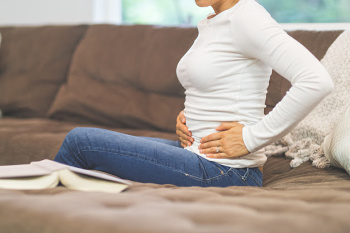
Women with chronic pelvic pain (CPP) are at higher risk for sexual dysfunction than women without CPP, research shows.
CPP strikes the pelvic region and lasts for at least six months. It can be caused by a number of health conditions, including endometriosis, pelvic inflammatory disease, and irritable bowel syndrome. Fibroids, painful bladder syndrome, pelvic organ prolapse, and ongoing stress have also been linked to CPP. Sometimes, the cause is unknown.
The pain can be constant or intermittent, sharp or dull. Women may feel like there pelvis is heavy. Using the bathroom and sitting for long periods can trigger the pain.
Ultimately, CPP can interfere with a woman’s day to day life, leading to sleep disorders and depression.
It can affect a woman’s sex life, too. To what extent? In a 2018 study, researchers compared the experiences of 100 women in Brazil. Fifty women had CPP; the rest did not. Overall, their average age was around 37 years.
Each woman completed a questionnaire called the Female Sexual Function Index (FSFI), a standardized assessment tool often used in studies of female sexuality. The FSFI focuses on six domains: desire, arousal, vaginal lubrication, orgasm, satisfaction, and pain. Higher scores on the FSFI indicate better sexual function.
The women were also evaluated for anxiety and depression.
Eighty-one percent of the women with CPP met the criteria for sexual dysfunction based on their FSFI scores. The rate for women without CPP was 58%. In addition, women with CPP had lower scores in the FSFI domains of desire, arousal, vaginal lubrication, orgasm, and pain compared to the women without CPP.
However, both groups had similar overall FSFI scores and satisfaction domain scores. “Satisfaction” in this sense refers to emotional closeness a woman feels with a partner during sex, her sexual relationship with her partner, and her sex life overall.
Women with CPP were more likely to have anxiety and depression, too, and the researchers suggested further study in this area. Depression in particular was associated with sexual problems in the CPP group.
Depression may diminish sex drive, deplete energy, contribute to poor self-esteem, and lead to social withdrawal, the authors explained.
What can women with CPP do? The first step is talking to their doctor. Depending on the cause, CPP might be treated with medications, hormone therapies, physical therapy, spinal cord stimulation, trigger point injections, and surgery. If depression is a concern, talk therapy can help. Women may also think about couples counseling or sex therapy.
Resources
Journal of Pain Research
Da Luz, Rosa Azevedo, et al.
“Evaluation of sexual function in Brazilian women with and without chronic pelvic pain”
(Full-text. November 8, 2018)
https://www.dovepress.com/evaluation-of-sexual-function-in-brazilian-women-with-and-without-chro-peer-reviewed-article-JPR
Mayo Clinic
“Chronic pelvic pain in women”
(August 11, 2017)
https://www.mayoclinic.org/diseases-conditions/chronic-pelvic-pain/symptoms-causes/syc-20354368
You may also be interested in...
Other Popular Articles

What Is Jelqing, and Does It Actually Work?
The term “jelqing” refers to a set of penis stretching exercises that some believe can make the penis bigger. Although the practice has gained attention and popularity in blogs and internet forums in recent years, there is no scientific evidence that it is an effective way to permanently increase the size of one’s penis. In fact, in some cases, jelqing may actually cause damage to the penis, so it is a good idea to get all the facts before setting off to try it.

What Is Sensate Focus and How Does It Work?
Sensate focus is a technique used to improve intimacy and communication between partners around sex, reduce sexual performance anxiety, and shift away from ingrained, goal-oriented sexual patterns that may not be serving a couple.

What Is the Average Penis Size?
If you have ever wondered how your penis compares to others in terms of size, you are not alone. Many men are curious to know how their penises stack up compared to the average. Unfortunately, general curiosity can sometimes give way to full-on obsession and anxiety about penis size. This can be an unhealthy and often unnecessary fixation, especially because most men who think their penises are too small have perfectly normal-sized penises.

Can Sex Reduce Menstrual Cramps?
The SMSNA periodically receives and publishes ‘guest editorials.’ The current article was submitted by Mia Barnes, a freelance writer and researcher who specializes in women's health, wellness, and healthy living. She is the Founder and Editor-in-Chief of Body+Mind Magazine.
Having sex while you experience menstrual cramps is healthy and can provide significant benefits. While it might not be the first activity that comes to mind when your PMS or period cramping begins, many people enjoy sex to reduce menstrual cramps, experience increased pleasure and benefit from other advantages. Learn more about having sex while menstrual cramps are happening and how it can help your body.

What Is Edging and Why Do People Do It?
Edging is the practice of stopping sexual stimulation before reaching orgasm to prolong a sexual experience. The term stems from the concept of approaching the metaphorical “edge” of orgasm but stopping before going over the edge.

The Effect of Regular Aerobic Exercise on Erectile Function
Erectile dysfunction (ED) is the inability to achieve or maintain an erection sufficient for satisfactory sexual activity. As men get older, their erectile functioning may naturally decline due to changes in testosterone levels, cardiovascular functioning, and the potential development of other chronic medical conditions that become more common with age.

